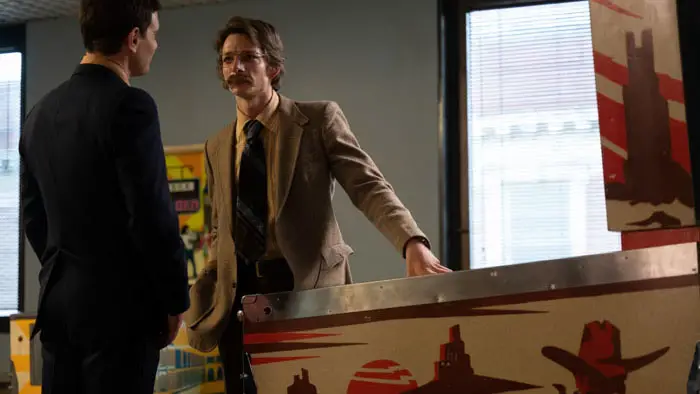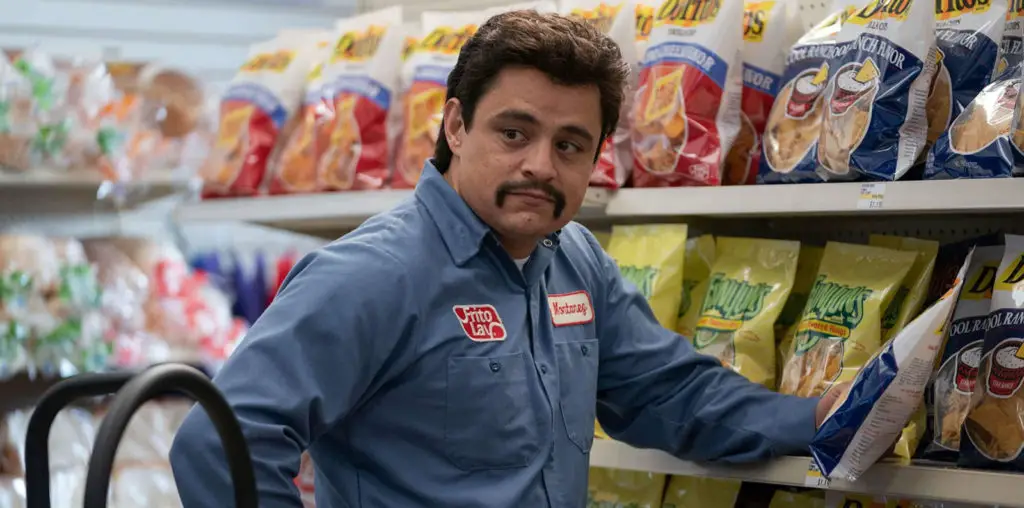
Many people think that pinball is a game of chance versus skill. Nowadays, it’s difficult to believe that it was actually outlawed as gambling in large cities such as New York as late as 1975. Enter co-writers and co-directors Austin Bragg and Meredith Bragg and their comedic drama Pinball: The Man Who Saved the Game. The true life story chronicles one man’s passion and determination to show that pinball is a game of skill and how he changed the course of history to make the world happier. Along the way, he’d find love, which would alter the course of his life. The film blends these two stories perfectly, making for an inspirational, quirky, and delightful underdog/love story.
The film mainly focuses on a young Roger Sharpe (Mike Faist) in the 1970s but flashes to an older, current-day version (Dennis Boutsikaris) who comments about his story as if doing a documentary. Young Roger (who has a fittingly for the era large and comical style mustache) is at a crossroads in life, having been recently divorced, jobless, and moving alone to New York City from Chicago. Then, one fateful day, he runs into a guy at a bar who shows him that pinball is actually a game about control that can be mastered, which fosters Roger’s obsession.
On another fateful day, Roger bumps into a beautiful secretary named Ellen (Crystal Reed) in the elevator. An awkward conversation on the way to a job interview ensues. She shockingly still gives him her number, and he lands an assignment that eventually gets him a job at GQ magazine. Roger hits an obstacle when Ellen tells him that she has an 11-year-old son, Seth (Christopher Convery). A more significant roadblock is when Roger discovers that pinball is outlawed in N.Y.C., so he has to go to a seedy adult bookstore to play the only machines around.

“…Roger discovers that pinball is outlawed in N.Y.C., so he has to go to a seedy adult bookstore to play…”
Every aspect of Pinball: The Man Who Saved the Game is top-notch. The main players lead the way with humor and charm. The writing and directing blend comedy and authenticity quite well. Such a balance extends all the way to the production design. Roger humorously takes Ellen to the adult bookstore on one of their first dates, and she’s naturally wondering what the heck is going on. They then play pinball together, and it clicks for her that the game has such a calming, zen-like effect on Roger. It’s his happy place, “like a kid in an adult bookstore,” she jokes.
More adversity strikes as Roger works on his dream project of a book about pinball. Unfortunately, his publisher tells him that they’re not interested in publishing the interview portion of the book that he worked so hard on and laid out the history of the game straight from the men who were central to it. At the same time, there are some pinball industry lobbyists who are trying to recruit Roger to help them get the game legalized, and he wants no part of it at first.
It all sets up for a showdown at City Hall (much like a gunfight in an old Western), where Roger has to play pinball in front of the Council to show that it’s a game of skill. I really enjoyed both the big moments and quieter scenes, like when Roger asks Ellen’s son for permission to spend the night after his car broke down. Or when Roger and Ellen both give each other reasons why the other would want to leave on their first date, but they each reply with “I’m still here.”
This true story is about love and passion for both people and what makes us happy (without causing pain to others). Pinball: The Man Who Saved the Game exemplifies the meaning of life in a way that higher profile, big-budget films should only aspire to.

"…exemplifies the meaning of life in a way that higher profile, big-budget films should only aspire to."


